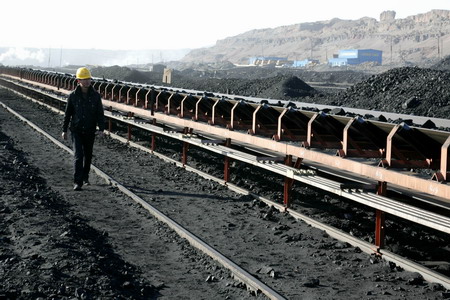China's energy imports to increase
Updated: 2011-06-02 09:29
By Lan Lan (China Daily)
|
|||||||||||
|
 |
|
A worker walks past coal transportation facilities in Hami prefecture, Xinjiang Uygur autonomous region. China said it will increase imports of energy products, including coal, to help ease power shortage. [Photo / China Daily] |
Experts predict China will see a energy shortfall of 30 million kilowatts in 2011
BEIJING - China will tackle an impending power shortfall by increasing energy imports, said the National Development and Reform Commission (NDRC), the top economic planner, on Wednesday.
The nation is expected to see a serious shortage this summer, said Li Yang, director-general of the NDRC's Bureau of Economic Operations Adjustment.
"With the coming of summer, the peak time for energy consumption, and the rapid growth of industrial production, the gap between electricity demand and supply will become more obvious and some areas may face a shortfall in coal and oil supplies," the bureau said in a statement.
| ||||
China's net coal imports declined by 13.56 million tons, or 27.2 percent year-on-year in the first four months of 2011. Rising international coal prices, about 100 yuan ($15.4) more for each ton than domestic prices, are the major cause of the decline, according to the bureau.
The use of natural gas for power generation has also been increased to address the problem of tight supply. Gas-fired power plants in six provinces, including Henan and Jiangsu, tripled the supply of electricity they generated using natural gas.
"Imports of natural gas increased relatively rapidly," Li said, without providing details.
Despite the power shortage, China has made the supply of residential electricity a top priority, and the supply for the public sector, such as schools and hospitals, will be guaranteed, he said.
Residential electricity demand accounted for about 13 percent of the nation's overall demand in the first four months.
A host of factors have caused this year's electricity shortage, Li said. Some areas which are usually served by hydropower have suffered after severe droughts in the southwest and central regions.
Moreover, new energy-guzzling projects in a number of areas have also led to increased electricity consumption.
Energy use in industries such as building materials and chemicals also saw an increase in the first four months of the year.
"The root cause for the power supply shortfall in some areas is the unbalanced economic structure and the unrestrained use of energy," Li said.
He said the situation should be addressed, and that it is contrary not only to the country's efforts in energy conservation and environmental protection, but also the nation's energy-saving target.
Some provinces have implemented power rationing since April to ensure residential supplies, and the amount of electricity supplied to plants with high energy requirements has been reduced in a number of areas.
On Wednesday, the government raised power prices for industry, commerce and agriculture in 15 regions by an average 0.0167 yuan for each kilowatt-hour, the first retail power price rise since 2009.














